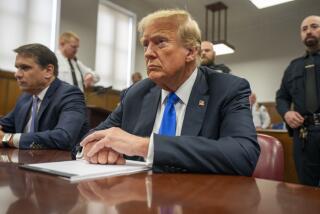UPDATE : Tucker Conviction May Be Factor in President’s Election Fate : A rival long in Clinton’s shadow, Arkansas governor is discussing deal since being found guilty of fraud, conspiracy in Whitewater-linked trial.
- Share via
LITTLE ROCK, Ark. — For two decades, Jim Guy Tucker, a gifted, young Arkansas politician, has moved in the ever-lengthening shadow of his more illustrious contemporary, Bill Clinton. Over the years, the rivalry between the two Democrats gradually turned to bitter resentment.
Thus it is a brutal twist that Tucker, who was convicted of fraud and conspiracy last week in the first Whitewater-related trial, is resigning as governor as a direct result of a criminal investigation of Clinton.
For the record:
12:00 a.m. July 3, 1996 For the Record
Los Angeles Times Wednesday July 3, 1996 Home Edition Part A Page 3 Metro Desk 2 inches; 52 words Type of Material: Correction
Whitewater--Because of an editing error, an article in June 12 editions of The Times incorrectly stated the date on which former Arkansas Gov. Jim Guy Tucker was convicted in a Whitewater-related trial and the date on which his lawyer flew to Washington to discuss a possible deal with the independent counsel. Tucker was convicted May 28. The meeting was held two days later.
As Tucker sees it, according to his friends, he would never have been tried for these crimes if his nemesis had not been elected to the White House.
Yet Tucker’s conviction also has given him more leverage over Clinton’s political fortunes than he ever had when two men were competing for office in Arkansas. Indeed, he could play a pivotal role in influencing the outcome of the larger Whitewater saga.
Last Thursday--just two days after the conviction of Tucker and of Clinton’s former investment partners James B. and Susan McDougal--Tucker’s lawyer, George B. Collins, flew to Washington to discuss a possible deal with Whitewater independent counsel Kenneth W. Starr.
While these talks so far have been inconclusive, the prospect of cooperation by Tucker could strengthen Starr’s hand against Clinton and hurt the president’s chances of winning reelection in November.
Tucker, 52, who suffers from chronic gastrointestinal problems, is seeking to avoid a prison term and the expense of a lengthy legal appeal of his conviction, as well as the cost of defending himself from a pending second indictment.
On the other hand, if Tucker decides to follow through with his public vow to take his case to the Supreme Court, the legal battle would include an appeal of that second indictment--and the outcome could not only help determine the ultimate scope of Whitewater but also influence all future investigations by independent counsels.
That appeal would be based on the notion that Starr exceeded his authority as independent counsel by prosecuting cases with no direct link to Clinton. Legal scholars believe that a Supreme Court ruling on this argument could redefine the breadth of the independent counsel statute under which Starr is investigating the president and prosecuting Tucker.
Although Clinton has made a concerted effort to patch up his relationship with Tucker, including telephoning the governor after the verdict to express sympathy and offer words of encouragement, the president said in videotaped testimony during the trial that the animosity between the two men runs deep.
It began in large part because Clinton and Tucker are so similar, say many Arkansans. Not only are they both lawyers and close in age, but Clinton and Tucker share the same views on many political issues, as well as the same burning ambition.
Clinton recalled that the two men had their first run-in in 1982, when they were competing for the Democratic nomination for governor--a job that Clinton had held from 1978 to 1980. “It was a very difficult, very heated race and it left some hard feelings,” he said in his trial testimony. ‘I was lucky enough to win it. But we were sort of estranged after that.”
The rivalry reignited in 1990 when Tucker decided to run for governor, apparently thinking Clinton would step down to seek the presidency. Instead, Clinton chose to seek reelection and also run for president, forcing Tucker to lower his sights and serve as Clinton’s frequently hostile and uncooperative lieutenant governor.
Although Clinton eclipsed him in politics, Tucker was wildly successful in his business ventures between his stints in public office. Investments in cable television have made Tucker a multimillionaire.
Not until Clinton moved to the White House in January 1993 did Tucker finally come into his own as governor and the recognized leader of the state Democratic Party. But his days in the political spotlight were short-lived. He was soon dogged by allegations linking him to the controversy that was enveloping the Clinton administration in Washington.
Last week, a federal court jury here found that Tucker participated in a conspiracy with other Clinton political associates to defraud a federally insured savings and loan owned by the McDougals and a government-backed small business investment firm owned by the prosecution’s star witness, David Hale.
Defense attorneys now recognize that they made a mistake in staking their defense almost entirely on the testimony of the president, whose broad-brush testimony was discounted by the jurors as irrelevant to the specific charges at hand.
Stunned by the verdict, Tucker, who had expected to be acquitted on the charge of conspiracy, immediately announced that he would resign from the governorship by July 15 to spare the state further embarrassment. His decision engendered considerable praise and sympathy from the citizens of Arkansas.
Because U.S. District Court Judge George Howard Jr., who presided over the 12-week trial, has a reputation for handing down harsh sentences in white-collar crime cases, the conviction appeared to foreshadow a lengthy prison sentence for Tucker.
On the day after the verdict, however, Tucker made one of his regular visits to the Mayo Clinic and received more startling news: He must undergo a liver transplant soon.
Tucker’s medical condition was the primary topic at his lawyer’s meeting with Starr, according to Collins. The lawyer told Starr that Tucker cannot be available for a liver transplant on short notice if he is confined to a federal penitentiary. If Starr recommended a lighter sentence, Collins said, Tucker would forgo all appeals.
Both Collins and Tucker’s press secretary, Max Parker, insisted that the Arkansas governor does not have any incriminating information about the president to share with Starr. Starr has refused to comment on the negotiations.
Nevertheless, W. Ray Jahn, Starr’s assistant who represented the independent counsel in the trial, told reporters for the Washington Post and the New York Post last week that his office is prepared to cooperate with Tucker and other defendants.
If Tucker fails to reach agreement with Starr, Collins said, he is ready to wage an aggressive legal battle on two separate fronts. Not only will he appeal his conviction but Collins is currently preparing to ask the Supreme Court to hear his appeal challenging a second indictment brought by Starr against Tucker.
In that second indictment, Tucker and co-defendants John Haley and William J. Marks are accused of conspiring to avoid tax obligations on one of Tucker’s cable television ventures.
The indictment was thrown out by U.S. District Judge Henry Woods of Little Rock last August on grounds it was outside the jurisdiction of the independent counsel. But it was reinstated recently by the 8th Circuit Court of Appeals, which agreed with Starr’s argument that courts cannot limit his jurisdiction. Tucker is appealing that ruling to the Supreme Court.
In the petition Tucker will file with the Supreme Court this month, his attorney will argue that an independent counsel who is appointed to investigate the president should be barred from prosecuting state government officials on unrelated matters.
Starr, who as a former solicitor general has considerable experience in arguing before the Supreme Court, will counter that his appointment by a three-judge appeals court panel in Washington gives him broad latitude to prosecute seemingly unrelated cases as long as they are uncovered in the course of his primary investigation.
More to Read
Sign up for Essential California
The most important California stories and recommendations in your inbox every morning.
You may occasionally receive promotional content from the Los Angeles Times.










